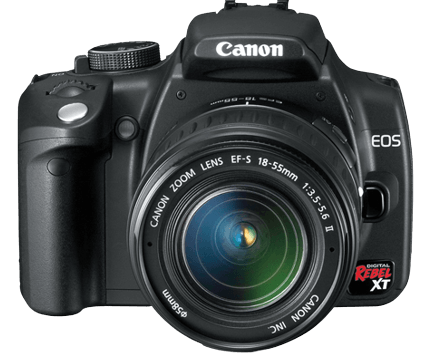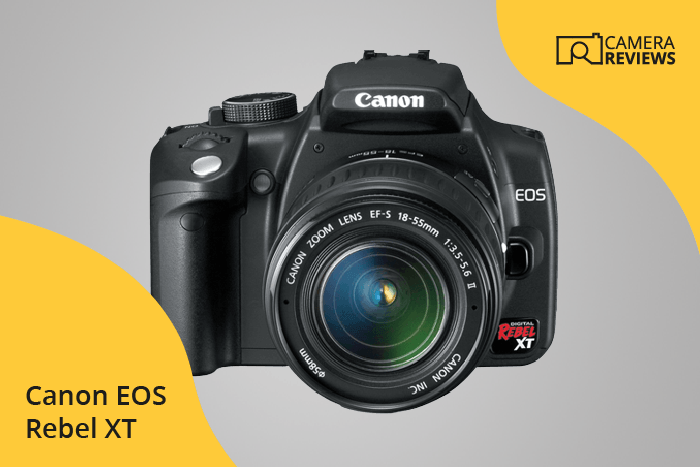Canon EOS Rebel XT / 350D Specs and Scores

The Canon EOS Rebel XT / 350D receives a score of 29/100, reflecting its general specifications. Announced on February 17, 2005, this DSLR camera was launched at a price of $560. Measuring 127 x 94 x 64mm and weighing 540g (1.19lbs), it is relatively compact and lightweight for its time.
Given today’s market, the Rebel XT / 350D’s specifications may not impress modern photographers. However, it was a solid option for its time, offering decent performance at an affordable price. This camera proves that older models can still have value and relevance in certain situations.
Canon EOS Rebel XT / 350D Overview and Optics
The Canon EOS Rebel XT / 350D receives an optics score of 39/100. With 8 megapixels, the camera has a shooting speed of 2.8 frames per second and uses a CMOS sensor powered by the Digic II processor. The DXOMARK score for the sensor is 60, which is relatively low compared to modern cameras. The sensor size is APS-C and the camera uses a Canon EF-S lens mount. There is no image stabilization, and the aspect ratio is 3:2.
Comparing these specifications to today’s market, the Canon EOS Rebel XT / 350D falls short in several areas. The megapixel count and shooting speed are low, and the lack of image stabilization may result in less sharp images, especially in low-light conditions. The camera’s sensor and processor are outdated compared to newer models, which can affect image quality and performance.
Despite these limitations, the Canon EOS Rebel XT / 350D may still be suitable for those who prioritize affordability over cutting-edge features. However, for individuals seeking better image quality and performance, there are more advanced options available in the market.
Canon EOS Rebel XT / 350D Video Performance
The Canon EOS Rebel XT / 350D lacks video capabilities. This camera only captures still images and does not record video.
Canon EOS Rebel XT / 350D Features and Benefits
The Canon EOS Rebel XT / 350D feature score is 8/100. This score reflects the camera’s outdated specifications in comparison to modern cameras. The screen size is 1.8 inches, with a resolution of 115,000 dots. It lacks a touchscreen, flip screen, GPS, WIFI, and Bluetooth capabilities.
These specifications reveal the limitations of the Rebel XT / 350D in today’s market. Contemporary cameras offer larger screens, higher resolutions, and a variety of connectivity options. The absence of a touchscreen and flip screen hinders the user experience, while the absence of GPS, WIFI, and Bluetooth limits sharing and geotagging capabilities.
The Canon EOS Rebel XT / 350D, with its low feature score and outdated specifications, struggles to compete with modern cameras that offer more advanced features and improved user experiences.
Canon EOS Rebel XT / 350D Storage and Battery
The Canon EOS Rebel XT / 350D receives a storage and battery score of 29/100. It has one memory card slot that accepts Compact Flash (Type I or II) cards. While sufficient for its time, this storage capability may seem limited compared to modern cameras that offer multiple card slots and support for SD or SDXC cards.
The battery life of the Rebel XT / 350D allows for 600 shots, powered by an NB-2LH battery. However, it lacks USB charging, which is a common feature in today’s camera market. Despite its age, the battery life remains adequate for casual photography sessions.
The storage and battery capabilities of the Canon EOS Rebel XT / 350D are dated but functional. Users may find some limitations compared to current camera models, but for those seeking a more affordable and simpler option, this camera can still serve its purpose.
Canon EOS Rebel XT / 350D Alternatives
Do you want to know how the Canon EOS Rebel XT / 350D compares to its competitors? Have a look at the most popular comparisons for this camera below:
- Canon EOS Rebel XT / 350D vs Nikon D3000
- Canon EOS Rebel XT / 350D vs Nikon D3500
- Canon EOS Rebel XT / 350D vs Nikon D750
- Canon EOS 1D Mark II N vs EOS Rebel XT / 350D
- Canon EOS 60D vs EOS Rebel XT / 350D
- Canon EOS M6 Mark II vs EOS Rebel XT / 350D
Canon EOS Rebel XT / 350D FAQ
Does the Canon EOS Rebel XT / 350D Have Built-in Image Stabilization?
The Canon EOS Rebel XT / 350D does not have built-in image stabilization. However, it supports lenses with image stabilization features, which can help reduce camera shake.
Does the Canon EOS Rebel XT / 350D Support 4K Video Recording?
The Canon EOS Rebel XT / 350D does not support 4K video recording, as it lacks video functionality altogether. It is primarily designed for still photography.
What Size Sensor Does The Canon EOS Rebel XT / 350D Have?
The Canon EOS Rebel XT / 350D is equipped with an APS-C sized sensor, which is smaller than a full-frame sensor but larger than a micro four-thirds sensor.
Does the Canon EOS Rebel XT / 350D Have a Dual Memory Card Slot?
No, the Canon EOS Rebel XT / 350D has a single memory card slot, which supports CompactFlash (CF) cards.
Does the Canon EOS Rebel XT / 350D Have a Touch Screen?
The Canon EOS Rebel XT / 350D does not have a touch screen. It features a 1.8-inch fixed LCD screen for image review and menu navigation.
Does the Canon EOS Rebel XT / 350D Have Wi-Fi and Bluetooth?
The Canon EOS Rebel XT / 350D does not have built-in Wi-Fi or Bluetooth connectivity. Wireless transfer of images requires additional accessories.
Does the Canon EOS Rebel XT / 350D Have GPS?
No, the Canon EOS Rebel XT / 350D does not have a built-in GPS feature for geotagging photos.
Is the Canon EOS Rebel XT / 350D Weather Sealed?
The Canon EOS Rebel XT / 350D is not weather-sealed, so it is not recommended for use in harsh weather conditions without proper protection.
Does the Canon EOS Rebel XT / 350D Have a Built-in Flash?
Yes, the Canon EOS Rebel XT / 350D has a built-in pop-up flash for low light situations and fill flash purposes.

